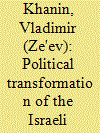| Srl | Item |
| 1 |
ID:
093901


|
|
|
|
|
| Publication |
2010.
|
| Summary/Abstract |
The Israel Our Home (Israel Beiteinu, IB) party became the major surprise of the 2009 elections, winning 15 Knesset seats. Two-thirds of these seats were won through Russian speakers, who entered Israel in the recent waves of Russian Jewish immigration; and a third came from veteran and native Israelis. This composition showed a major dilemma of IB - to find a modus vivendi between the party's nationwide aspirations and its predominantly Russian community character. The IB's electoral success was a result of its concept of a 'population and territories exchange', which was a 'neo-centralist alternative' to both the 'land for peace' of the left and the 'peace for peace' concepts of the right, as well as the charismatic figure of the party leader Avigdor Lieberman, who better than anybody else succeeded in expressing the feeling of frustration of the various peripheral groups in Israeli society.
|
|
|
|
|
|
|
|
|
|
|
|
|
|
|
|
| 2 |
ID:
137548


|
|
|
|
|
| Summary/Abstract |
The Great Aliya from the USSR and the post-Soviet states began a quarter of a century ago, bringing to Israel about 1.1 million Russian-speaking Jews and their family members. This population corresponds to approximately 19 Knesset seats, and is thus a crucial factor in Israeli electoral politics. From the late 1990s this community was almost equally divided in its sympathy between nationwide mainstream parties and Russian sectarian immigrant parties. However, if previously there were either purely sectarian or nationwide parties, in the past decade the majority of Russian Israelis prefer new types of political representation: either a ‘Russian party with an Israeli accent’ (mainly Israel Beiteinu) or an all-Israeli party with some Russian accent (i.e. Likud). Nevertheless, despite the similarities in the ideological orientations and socioeconomic views, the Russian-speaking supporters of both political parties represent two distinct political cultures among the Israeli community of former Soviet Union olim and their children. This may explain why the joint list of Likud–Israel Beiteinu during the 2013 Knesset elections experienced substantial losses of each party's traditional ‘Russian’ (as well as general) voters, many of whom opted this time for parties of the ‘contentious middle class’ – the right-wing Habayit Hayehudi and ‘centrist’ Yesh Atid. This article argues that in the coming years, the Russian community's politics in Israel will continue to search for an optimal model of combination of a party's ethnic base with a mainstream platform, and which constitute an exemplary model and inspiration of political participation for other ethnic or cultural identity oriented groups, such as English-, French- and Amharic-speaking immigrants, and for the ‘new haredim’.
|
|
|
|
|
|
|
|
|
|
|
|
|
|
|
|
| 3 |
ID:
078595


|
|
|
| 4 |
ID:
101635


|
|
|
|
|
| Publication |
2011.
|
| Summary/Abstract |
Mass Soviet Jewish emigration has turned Israel into the largest centre of Russian-speaking Jewry in the world, and became a critical factor in the local political landscape. This group managed to change the previous right-left balance and thus became a desirable target for any candidate seeking to head the government as well as the majority of nationwide parties. 'Russian' immigrants themselves very soon became split over the general issues of Israeli politics (ideological, civic, ethnic and class controversies), that in fact indicted their integration into the local society. Finally, since the late 1990s FSU immigrants are almost equally divided between mainstream and community-centred parties, leaning towards movements that combine both sectarian and nationwide agendas.
|
|
|
|
|
|
|
|
|
|
|
|
|
|
|
|